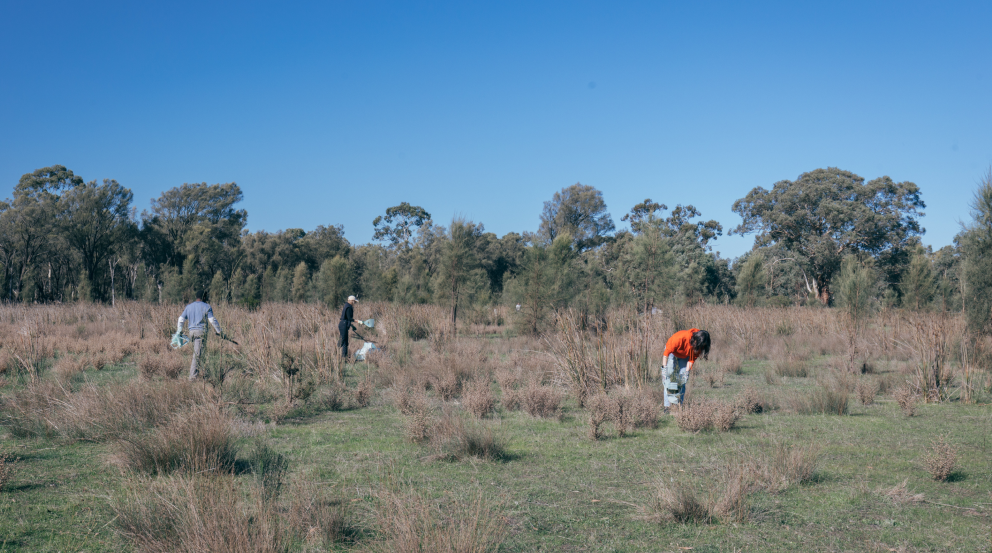Evidence shows that more women in decision-making equals better environmental outcomes, yet time and time again they are overlooked for leadership roles. Fed up with the status quo, four giants of Australia’s conservation movement decided to do something about it by founding WELA. Now, this Bank Australia customer is changing the face of climate activism from the top down.
Behind every great woman is…more women. That’s the philosophy behind WELA aka Women’s Environment Leadership Australia – one of Bank Australia’s 2023 community customer grant recipients.
Co-founded by four matriarchs of Australia’s environment movement – who between them were the backbone of the campaign to save the Franklin River in Tasmania, plus driving forces behind the Wilderness Society and the Greens – WELA grew from the idea that women and gender-diverse people are the missing link in climate leadership.
“We are a community of women and gender-diverse people who are working to transform Australia's response to our environment and climate,” says Victoria McKenzie-McHarg, WELA’s strategic director. “And at the core of what we do is leadership development. The reason that is so central to the work that we do is because all the evidence shows categorically that more women in decision-making equals better environmental outcomes. So we figured we should do something about that.”
And, they’ve been doing just that for eight years now.

WELA runs leadership development programs for women and gender-diverse people who are already actively working or volunteering in the climate space. The genesis for the idea came when co-founders Margaret Blakers OAM, Judy Lambert OAM, Karen Alexander OAM and Dr Sue Lewis, noticed that women made up the bulk of volunteers on the frontline of the environment movement, but were rarely being elevated to decision-making roles or funded projects.
“Our approach takes a long term and systemic view of what change looks like – to get in behind it and back people's leadership,” Victoria says.
WELA’s leadership programs take a few different forms to help cater to the diversity of people interested in participating. Their flagship National Leadership Program is an intensive learning process that happens over seven months and includes face-to-face retreats and tailored mentoring. With the understanding that such an undertaking isn’t suited to every individual, they also designed the WELA Leadership Intensive, which is a single four-day course.
And to ensure that there are pathways to these courses for everyone, WELA offers community-funded First Nations scholarships, and scholarships for women in remote and regional Australia.

Victoria knows first hand how transformational these programs can be; in 2016 she completed one herself. At the time she was the national climate campaign manager for the Australian Conservation Foundation.
“I found it really quite transformative,” she says. “Although, three years later, I was still seeing the same gender issues play out across the progressive corporate spaces I was working in, and across government and NGOs.” With what she had learned in mind, Victoria came back to Sue and Karen and proposed an expansion of the programs. They agreed immediately, and went to work building WELA into what it is today.
Since then, WELA has also identified the need for grassroots support on a more ongoing basis as well.

“Lots of people either don't want a full program, or aren't ready or may not have the time in their lives for it,” Victoria explains. “But that doesn't mean they're not looking for support, connection, advice, and inspiration.” So WELA also recently launched their free community events Stories Of Change.
“These events are about bringing together changemakers across different generations to tell stories of their impact and influence and what they've learned along the way,” Victoria says. “One of the things that we have learned through our programs is just how important intergenerational and diverse perspectives are. And to have all those stories in the one space is really exciting.”
Bank Australia’s community customer grant will go towards supporting events like this one, to foster a community of learning and support among climate change makers of the past and activists of the future.

These are the kind of shared values that led WELA to bank with Bank Australia in the first place. “All organisations and all sectors have an opportunity to think about how they use the levers of change that are at their disposal,” says Victoria. “ And given the scale of the challenge that we have, we need to use everything we've got. Bank Australia is using those levers to create change – that aligns with our ethics.”
WELA’s work is just beginning, and Victoria knows they can help drive the kind of climate leadership we so desperately need.
“The leadership styles that got us into this mess are not going to be the leadership styles that get us out of it,” she says. “And if we want to see the large-scale systemic change that we know is needed for nature and for our climate, we've got to have different and better leaders. And women have got to be a part of that mix in all their diversity.”
Learn more about Bank Australia’s community customer grants.








